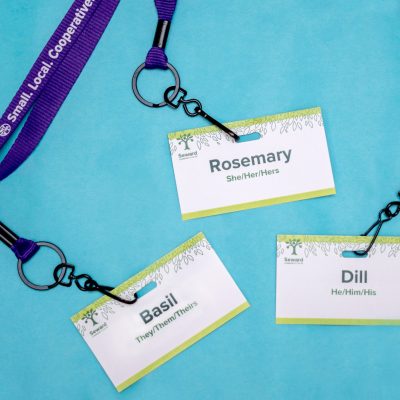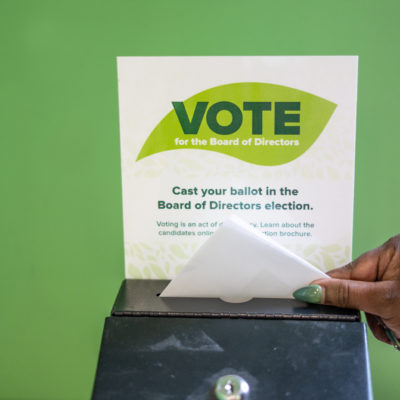Concern for Community is a Co-op Principle, Sustaining a Healthy Community is Our Mission
Our community and our nation are facing crises of opioid use and homelessness and they’re showing up at Seward Co-op. Focused on community-based solutions, Seward Co-op has joined forces with Twin Cities area co-ops, St. Stephen’s Human Services and the Minnesota Department of Health. Our approach is centered on harm reduction and restorative justice.
Seward Co-op’s Ends Statement calls us to sustain a healthy community. Concern for community is an international cooperative principle. Both underline everything we do. “Everyone Welcome” is posted at the entrances of each of our locations. We remain committed to welcoming everyone into the co-op community. How does this take shape when Minnesota experiences record levels of homelessness and Hennepin County a 50-percent uptick in deaths related to opioid use?
Staff leaders at Seward Co-op are committed to addressing common misconceptions. These issues have affected individuals throughout the co-op community, including our employees, shoppers and neighbors. A Wilder Research survey says substance use and homelessness don’t always go hand in hand. About 20 percent of people experiencing homelessness are also experiencing a substance use-related issue. At all Seward Co-op locations, we have seen an increase in people who sign near the entrances and we’ve also seen increased indications of opioid use. But, we treat them as what they are: separate issues that at times overlap.
Employees have received training to compassionately handle behaviors we’ve noticed. At each of our locations, we’re having conversations with individuals who may be experiencing a particular issue or a combination of issues. We focus on individual well-being and specific cases, offering resources when necessary and fairly enforcing co-op policies. We avoid making assumptions about a person’s journey and ask community members to do the same.
We don’t want to presume what community members need. Instead, we look to existing community-driven, community-based solutions. When we hear the needs of folks with lived experience, together we can advocate for systemic change. While Seward Co-op is a community-owned enterprise, fundamentally we are a food business. So, we rely on the experts. Co-op leadership is working with local nonprofits and the Minnesota Department of Health to provide support to our staff and neighbors. We’re also collaborating with area co-ops on a united approach to both improve and raise awareness of crises facing our communities.
There are things that we can do as individuals that create collective impact. Round up for SEED grant recipients throughout the year or make a direct contribution to a social services organization of your choice. Advocate for social and policy changes that address underlying issues. MN Coalition for the Homeless is a statewide effort to advance policy initiatives that lead to housing stability for all Minnesotans. The coalition has a robust 2019-2020 legislative agenda, titled Homes for All, supported by more than 200 area organizations. Learn more about 2019 outcomes and get involved at www.mnhomelesscoalition.org.
Please join us in creating a safe and welcoming space for all. We’ve heard from many people about their experience at our stores and see many of you already committed to this work. We appreciate you and welcome your input at seward.coop/contactus.
Seward Co-op is a community of more than 20,000 owners. Only together can we realize our mission of sustaining a healthy community that has equitable economic relationships; positive environmental impacts; and inclusive, socially responsible practices.
Resources related to housing, addiction and mental illness:
- The Homes for All website has extensive resources including a legislative agenda for 2019-2020, reports, factsheets and advocacy tools: homesforallmn.org. Homes for All is endorsed by more than 245 area organizations, including St. Stephens Human Services (mentioned above) and some of those below.
- National Alliance on Mental Illness Minnesota offers ways to get involved, including influencing legislation and public policies that affect the lives of those living with mental illness: namimn.org.
- Downtown Congregations to End Homelessness is an interfaith collaboration of 17 downtown Minneapolis churches, synagogues and mosques working together to end homelessness and poverty: www.dceh.org.
- One of DCEH’s specific programs is Street Voices of Change, which elevates the voice of people experiencing homelessness so all are equal partners in shaping the current experience of homelessness and ending it in the future: www.dceh.org/svoc/
- JustUs Health offers support to people from diverse gender, sexual, and cultural communities in risk reduction, assistance, health & wellness, and peer support. (Formed in 2018 by the joining of Minnesota AIDS Project and Rainbow Health Initiative.) www.justushealth.org
- Valhalla Place is a premier provider of addiction and mental health services in the Twin Cities, and via their Brainerd, MN office: valhallaplace.com
- The Steve Rummler Hope Network heightens awareness of the disease of addiction through providing critical education and training on overdose prevention: steverummlerhopenetwork.org


 Seward Co-op’s production kitchen is cooking up Fall favorites. Here are some highlights of what you’ll find in our stores:
Seward Co-op’s production kitchen is cooking up Fall favorites. Here are some highlights of what you’ll find in our stores:
